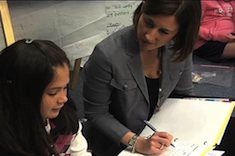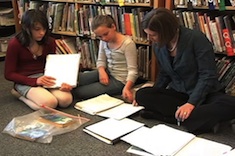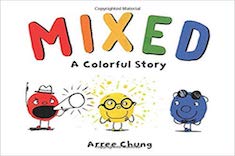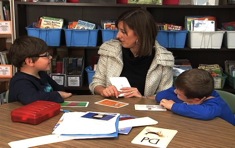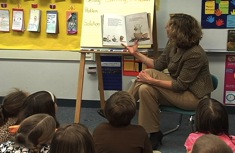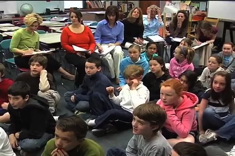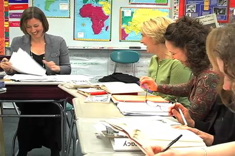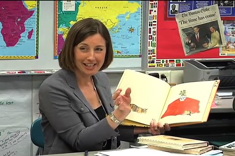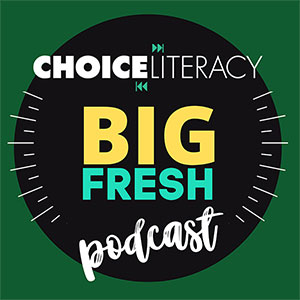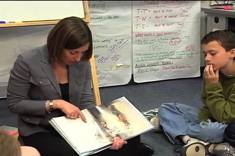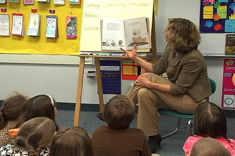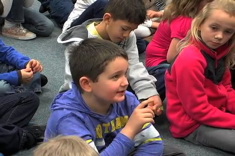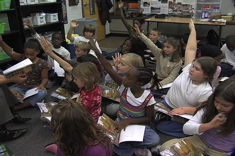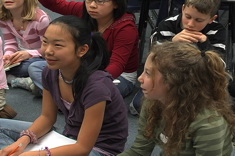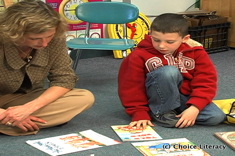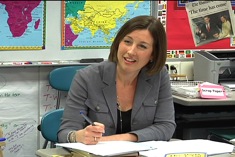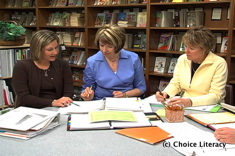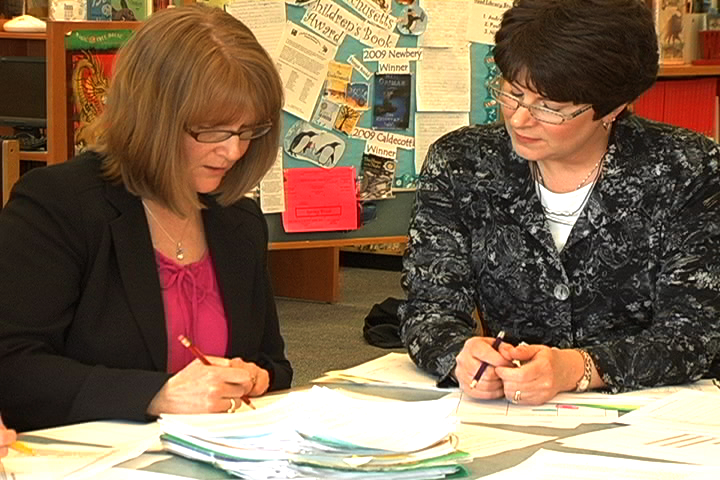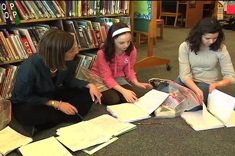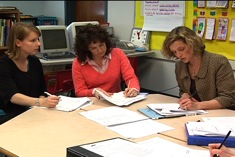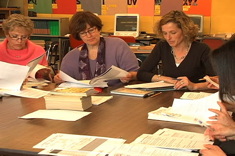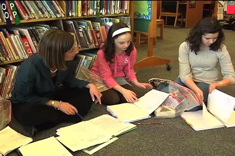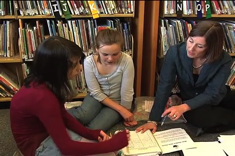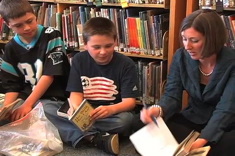Clare Landrigan
Clare Landrigan is a staff developer who is still a teacher at heart. She leads a private staff development business and spends her days partnering with school systems to implement best practices in the field of literacy and is on the board of The Book Love Foundation. She is the co-author of It’s All About the Books published by Heinemann and Assessment in Perspective, published by Stenhouse. She blogs about books and the art of teaching on her website www.clarelandrigan.com.
All Content
Coaching Minute: Notes and Forms
Clare Landrigan and Tammy Mulligan explain the value of using the same notetaking forms teachers use with students as they coach teachers. The practice not only informs their coaching, but helps teachers think through the strengths and weaknesses of the tools.
Kindergarten Small Group: Details in Writing
Clare Landrigan leads a demonstration small group on including details in writing. The demonstration includes a prebrief and debrief with the teacher.
Demonstration Small Group: Emergent Kindergarten Readers
Clare Landrigan leads a demonstration small group of emergent kindergarten readers focused on inferring. They are reading Cookie’s Week. The lesson includes a prebrief and debrief with the teacher.
Detour Texts
Clare Landrigan and Tammy Mulligan explain the concept of “detour texts”—picture books to use as mentor texts in the intermediate grades to illustrate complex literary elements. They also share three of their favorite new children’s books to use as detours.
Quick and Frequent Demonstration Lesson: Phonemes
Clare Landrigan leads a demonstration lesson with a pair of kindergarten students who struggle with letter-sound connections. In the video, she explains why these “quick and frequent” reading activities are helpful for young learners who find it a challenge to participate in guided reading groups.
Demonstration Lesson: A First Grader Decodes and Makes Meaning
In this demonstration lesson, Clare Landrigan confers with a first grader by building on his strengths of growing fluency and volume with strategies for decoding. The lesson includes a prebrief and debrief with the teacher.
First-Grade Demonstration Small Group: Reading Engagement
Clare Landrigan leads a demonstration small group with first-grade readers who struggle with engagement and stamina. The lesson includes a prebrief and debrief with their teacher.
Story Play with The Grouchy Ladybug
In this demonstration small group, Clare Landrigan leads kindergartners in a story play session featuring The Grouchy Ladybug. The lesson includes a prebrief and debrief with the classroom teacher.
Mentor Texts for Letter Writing
Clare Landrigan and Tammy Mulligan share some of their favorite mentor texts for a unit on letter writing.
Demonstration Small Group: Discussing a Common Text
In this demonstration small group, Clare Landrigan guides first graders as they practice discussion skills around a common text. The video includes prebrief and debrief sessions with the classroom teacher.
First-Grade Small Group on Opinion Writing
In this demonstration small group, Clare Landrigan helps first graders craft opinion writing. The demo includes quick individual conferences, as well as a prebrief and debrief with the classroom teacher.
Demonstration Lesson: From Play to Literacy in First Grade
Young children need a place and props for play in their classroom. But how can we transfer this learning from play to literacy instruction? Clare Landrigan works with a first-grade teacher and a small group of students to think through this dilemma in this demonstration lesson.
First-Grade Demonstration Group: Why Read?
A first-grade teacher shares a guilty secret: she isn't sure some of her students have an innate sense of the value of reading. Clare Landrigan leads a demonstration group to examine the issue and brainstorm solutions.
First-Grade Partner Reading
Clare Landrigan leads a demonstration lesson to show first-grade reading partners how to work together. The demonstration includes a prebrief and debrief with the teacher.
Confidence Through Poetry
In this demonstration conference, Clare Landrigan works with Lexi, a student who is developing confidence as a writer through exploring poetry, and transferring that learning to other subject areas. The lesson includes a prebrief and debrief with Lexi’s teacher.
Who Keeps You Up at Night?
Clare Landrigan and Tammy Mulligan ask this question to launch a discussion of one challenging learner and open teachers to the possibilities of case studies.
Learning Through Listening
Clare Landrigan and Tammy Mulligan provide some simple listening and questioning strategies to help coaches focus on the specific needs of each teacher.
Voice and Choice in the Goal-Setting Process
Clare Landrigan and Tammy Mulligan take a child step by step through the process of creating a meaningful writing goal.
A Timesaver for Coaching Cycles
Clare Landrigan and Tammy Mulligan leverage technology to improve their communication with teachers during coaching cycles.
Beanstalk Play for Literacy
Clare Landrigan works with a kindergarten group to foster literacy through play in this demonstration small group. The lesson includes a prebrief and debrief with the teacher.
Professional Development with 10 for 10
Clare Landrigan and Tammy Mulligan explain how to use 10 for 10 online book celebrations as a professional development tool. Now is a good time to start planning for the next event, in February.
Collections to Spark Writing
Clare Landrigan uses collections as a tool to spark writing among first graders during an upcoming vacation. This demonstration small-group lesson includes prebrief and debrief sessions with the children's teacher.
PD Playlist
Music is a potent and often overlooked tool in setting a mood in professional development settings. Clare Landrigan and Tammy Mulligan share some of their new favorite tunes for PD.
Getting Books into the Hands of Teachers
Clare Landrigan and Tammy Mulligan share suggestions for building interest in children’s books among teachers.
Go-To Texts for Demonstration Lessons
Clare Landrigan and Tammy Mulligan share some of their favorite mentor texts for demonstration lessons, and how to use them.
Text Sets for Reading Groups in Fourth Grade
Clare Landrigan and Tammy Mulligan support two fourth-grade teachers by suggesting text sets based on assessment data and small-group needs.
Visualizing to Sustain Reading: Second-Grade Small Group
Clare Landrigan leads a small-group demonstration lesson with second graders who are having trouble sustaining their reading. The strategy she teaches is visualizing as a way to help the children hold key details from the story. The lesson includes prebrief and debrief sessions with the teacher.
Coaching Tool: Evernote
Clare Landrigan and Tammy Mulligan describe how they use Evernote to enhance coaching collaboration and organize materials and assessments from professional development sessions.
Putting the “Gradual” Back into Gradual Release of Responsibility
If it’s not sudden release of responsibility or no release of responsibility, what does gradual look like? Clare Landrigan and Tammy Mulligan bring this model to life.
Temporary Strategies
Clare Landrigan confers with a student and discovers that a tool designed to help the reader is actually hindering her learning. The experience causes her to reflect on the need for flexibility when matching strategy scaffolds to young readers.
A Test Run for Difficult Decisions
Clare Landrigan and Tammy Mulligan describe a four-part protocol they use for working through their most challenging decisions.
Coaching Tool: Presentation Binders
Clare Landrigan and Tammy Mulligan explain how they organize on-the-go resources for presentations in this second installment in the coaching tools series.
Coaching Tool: Digital Books
In this first installment in a series, Clare Landrigan and Tammy Mulligan share one of their favorite coaching tools: digital books.
First-Grade Retelling Demonstration Lesson
Clare Landrigan leads this first-grade demonstration small group on retelling strategies. The demonstration includes prebrief and debrief meetings with the teacher.
Voice Notes
Clare Landrigan and Tammy Mulligan use voice notes as a way to be more reflective and systematic in organizing materials after professional development sessions.
Problems and Solutions: Small-Group Demonstration Lesson
In this demonstration small group, Clare Landrigan works with a second-grade teacher to reflect on the needs of two students and, after the lesson, debriefs with her about the learning.
What’s in Your Bag?
Clare Landrigan and Tammy Mulligan open their coaching bag and share every item on their “must-have” list for traveling from classroom to classroom.
First-Grade Writing Group: Catchy Endings
Clare Landrigan leads a demonstration small group with first graders who are having trouble writing catchy endings to their opinion pieces. The lesson includes a prebrief and debrief with the classroom teacher.
First-Grade Small Group: From Decoding to Monitoring for Meaning
Clare Landrigan leads a demonstration small group with Braden and Talis, who are working to move from an emphasis on decoding in first grade to monitoring meaning. The video includes a prebrief and debrief with the classroom teacher, Ann Vigne.
Using Reading Notebook Covers for Reflection and Goal Setting
Clare Landrigan and Tammy Mulligan are using reading notebook covers in ingenious ways.
Taking Breaks
This quick tip from Clare Landrigan and Tammy Mulligan will ensure you don’t overlook one of the most important elements of successful meetings: breaks.
Sign-In Sheets, Professionalism, and Being Human
Clare Landrigan and Tammy Mulligan explain why they will not take responsibility for one record-keeping tool: the sign-in sheet for professional development sessions.
Integrating the Bookroom into Professional Development Sessions
Clare Landrigan and Tammy Mulligan explain how bookrooms can be at the heart of professional development sessions that are designed to help teachers explore resources. This is another installment in their bookrooms series.
Systems for Keeping the Bookroom Organized and Manageable
From setups to all-calls to end-of-year reorganizations, here are Clare Landrigan and Tammy Mulligan’s best tips for keeping school bookrooms organized.
Working Together to Expand the Bookroom
Clare Landrigan and Tammy Mulligan outline a process for helping teachers organize, sort through, and expand offerings in school bookrooms. They include inventory and sample ordering templates.
Revising Bookrooms to Support Engagement and Instruction
Clare Landrigan and Tammy Mulligan share a system for organizing bookrooms by levels, genres, authors, and topics. This feature includes dozens of recommended books on Pinterest board links.
Assessment and Response to Intervention
Clare Landrigan and Tammy Mulligan explain why the promise of RTI won’t be fulfilled until individual assessments are more closely linked to interventions.
Coaching Minute: Strategic Reading for Our Youngest Learners
In this quick video tip, Tammy Mulligan and Clare Landrigan have wise advice for supporting strategic reading in young learners.
Rethinking End-of-Year Assessments
Clare Landrigan and Tammy Mulligan share strategies for getting the most out of end-of-year assessments, even those that are most likely to gather dust after they are administered.
Changing Two Words
Clare Landrigan and Tammy Mulligan explain how two simple word changes have made all the difference in building rapport with teachers.
First-Grade Writers: Demonstration Small Group
Clare Landrigan leads a demonstration small group with first graders. The video includes a planning session and debrief with the children's teacher.
Monitoring Meaning in First Grade
In this demonstration small group, Clare Landrigan helps first graders Tristan and Abby monitor meaning. The video includes excerpts from the planning and debriefing sessions with the children's teacher.
Tips for Conducting Demonstration Lessons, or How to Avoid the “Am I Doing This Right?” Question
Clare Landrigan and Tammy Mulligan have advice for literacy coaches leading demonstration lessons.
Kindergarten Small Group: Concepts of Print
Clare Landrigan leads a "quick and frequent" small group that integrates phonemic awareness activities with assessment.
The Value of Story Play
Clare Landrigan and Tammy Mulligan explain why story play is crucial in building children’s oral and written language skills. The feature includes a video of Clare leading a group of kindergartners in story play.
The Staircase Reading Response: Demonstration Small Group
In the second of a two-part video series, Clare Landrigan leads a demonstration small group with fourth graders who have an intriguing way of responding to reading.
The Staircase Reading Response: Planning Session
In this first video in a two-part series, Clare Landrigan and Tammy Mulligan meet with fourth-grade teachers to assess student reading responses and plan a demonstration small group that Clare will lead.
Coaching the Nuts and Bolts of Book Bags
Clare Landrigan and Tammy Mulligan have advice for the most common questions teachers ask about using book bags with young learners.
Pictures First
In this demonstration lesson, Clare Landrigan instructs a group of kindergartners who are stuck on the strategy of only "sounding it out" to decipher text.
Reading Workshop in Kindergarten: When and How to Launch
Clare Landrigan and Tammy Mulligan share wise advice about launching workshops in kindergarten.
Celebration Charts
Clare Landrigan and Tammy Mulligan find that celebrating small triumphs from the week is a great way to launch any professional development session.
Courage to Change: A Professional Development Activity
Clare Landrigan and Tammy Mulligan share a professional development activity using the book Courage that helps teachers look at change in new ways.
Drop the Rope
Clare Landrigan and Tammy Mulligan share a strategy for working through tense situations when coaching.
Demonstration Small Group: Retelling Strategies in First Grade
In this demonstration lesson, Clare Landrigan works with a group of first graders who need help developing retelling skills. The video includes a prebrief and debrief with the classroom teacher to help focus the lesson.
First-Grade Nonfiction Retelling Small-Group Demonstration Lesson
Clare Landrigan leads a nonfiction retelling small-group demonstration lesson. The video includes a prebrief and debrief with the teacher.
Ending Reading Workshop by Planning for September
Clare Landrigan and Tammy Mulligan find that a little effort at the end of the school year pays big dividends when launching workshops in the fall.
Understanding the Summer Slide: Sharing Data with Parents and Students
Clare Landrigan and Tammy Mulligan explain why it is important to share data with parents while school is still in session in order to avoid the summer slide. This is another installment in their summer reading series.
Coaching in the Moment
Clare Landrigan and Tammy Mulligan explain why unstructured coaching support time may be some of the most valuable to include in your schedule.
Making Summer Reading Plans
Clare Landrigan and Tammy Mulligan have advice for making summer reading plans with students. This is the next installment in their summer reading series.
Getting Books into Students’ Hands for Summer Reading
Clare Landrigan and Tammy Mulligan share tips for getting books to students for summer reading. This is the first installment in their new summer reading series.
Welcome Visits
Clare Landrigan and Tammy Mulligan explain why “welcome visits” are so important for building relationships, and how they make these visits an integral part of their professional development programs.
Coaching Minute: Principals and Professional Development
In this brief video, Clare Landrigan and Tammy Mulligan talk about the challenges of getting busy principals involved in professional development given how packed their schedules are.
Meaningful Transitions During Professional Development Sessions
Clare Landrigan and Tammy Mulligan share ideas for making transitions during professional development sessions lively, meaningful, and respectful.
Demonstration Lesson: Deeper Reading with Advanced Third Graders
Clare Landrigan works with a third-grade teacher to help two advanced students read deeply and look for evidence in texts in this demonstration lesson. The video includes a discussion before and after the small group with the teacher.
Coaching Minute: Pinterest
Clare Landrigan and Tammy Mulligan share the many ways Pinterest has enhanced their professional development with teachers.
Coaching Minute: Quick Connections
Clare Landrigan and Tammy Mulligan share the value of informal chance meetings with teachers they are coaching in this three-minute video.
Coaching Demonstration: Conferring with a Struggling Third-Grade Reader
Clare Landrigan works with third grader Reese as his teacher observes in this coaching demonstration conference.
Monitoring for Meaning Small Group
Clare Landrigan guides a small group of first-grade English language learners in a demonstration lesson.
Quick Check-ins: Touching Base Before Coaching Sessions
Clare Landrigan and Tammy Mulligan describe the art of the three- to five-minute check-in before collaborating with teachers in classrooms.
Who’s the Audience for Demonstration Lessons?
Who’s the audience for demonstration lessons? Clare Landrigan and Tammy Mulligan explain why it isn’t students, and advise coaches on how to open communication with teachers about effective demonstrations.
Picture It: Pinterest for Professional Development
Clare Landrigan and Tammy Mulligan find Pinterest is an excellent tool for organizing resources for professional development sessions.
Assessing Students: Many Hands for a Lighter Load
Clare Landrigan and Tammy Mulligan describe seven different strategies they’ve seen in schools for fostering more collaboration among teachers assessing students.
Planning for a Demonstration Lesson
Clare Landrigan takes a team of grades 3-5 teachers through the steps of selecting a book for a demonstration lesson.
Building Community Protocols
Clare Landrigan and Tammy Mulligan share two of their favorite protocols for building community among educators.
Off the Dance Floor and Onto the Balcony: Getting the Big Picture in Schools
In the day-to-day triage of our schools and the sense of urgency that pushes us to always be accountable for every minute of the day, we need to keep the big picture in mind. Clare Landrigan and Tammy Mulligan help school leaders figure out how to use their time wisely in the early days of building relationships.
Tips for More Effective Debriefing Sessions
Clare Landrigan and Tammy Mulligan share strategies and seven different observation templates for participants to download and try out.
Triangulating: The Importance of Multiple Data Points When Assessing Students
No data point for any child stands alone. Clare Landrigan and Tammy Mulligan write about the importance of triangulating data when looking at student assessments, and in the process affirm the value of classroom observations.
Personal Conferring Notebooks
With more than 75% of students receiving extra support in a high-need district, Clare Landrigan and Tammy Mulligan struggled to find tools to help teachers collaborate around student needs. Enter the personal conferring notebook, a terrific vehicle for teachers to record insights about students working with multiple teachers and specialists.
Previewing and Picture Walks with Fiction Texts
Clare Landrigan and Tammy Mulligan provide previewing how-to advice for grades K-2 teachers.
Getting the Most Out of Visiting a Colleague’s Classroom (PODCAST)
Tammy Mulligan and Clare Landrigan talk with Franki Sibberson about strategies for getting the most out of observing in a colleague’s classroom.
Creating a Coaching Schedule
Tammy Mulligan and Clare Ladrigan give advice on creating schedules for literacy coaches that integrate district goals and teacher interests.
Ways to Avoid Coaching Traps
There are many traps for new literacy coaches that are rarely discussed. Clare Landrigan and Tammy Mulligan share the most common four they try to avoid.
Quick Take: Protocols for Teacher Study Groups
In this three-minute Quick Take video, Clare Landrigan describes the teacher study group protocol she uses to foster shared understanding and allow for differentiated learning among teachers.
Eliminating the Conga Line: Teaching Young Children About Strategic Thinking
Clare Landrigan and Tammy Mulligan manage to synthesize workspace cleanup, student independence, and a concrete analogy for strategy work in classrooms.
Teaching Revision Through Talk, Routines, and Drawing
Clare Landrigan and Tammy Mulligan have some practical advice for using drawing, talk, and routines as ways into understanding writing revision for learners in the primary grades.
What to Say on Parent Teacher Night
Clare Landrigan and Tammy Mulligan present some of the anecdotes and research they would share with parents during open houses and conferences.
Planning for a Demonstration Lesson Part 1
In this first installment of a video series, Clare Landrigan takes a team of grades 3-5 teachers through the steps of planning for a demonstration lesson.
Planning for a Demonstration Lesson Part 2
In this second installment of a two-part video series, Clare Landrigan takes a team of grades 3-5 teachers through the steps of selecting a book for a demonstration lesson.
Building Community Protocols
Clare Landrigan and Tammy Mulligan share two of their favorite protocols for building community among educators.
When You Hate the Book
Abandoning a text isn't always an option (in school or life). Clare Landrigan considers her own experience as a reader and applies those lessons to the classroom.
Getting the Most Out of Visiting a Colleague’s Classroom (PODCAST)
Tammy Mulligan and Clare Landrigan talk with Franki Sibberson about strategies for getting the most out of observing in a colleague’s classroom.
A More Literate Show and Tell
Tammy Mulligan and Clare Landrigan work with a kindergarten teacher to integrate literacy skill development into this favorite routine of young children.
Off the Dance Floor and Onto the Balcony: Getting the Big Picture in Schools
In the day-to-day triage of our schools and the sense of urgency that pushes us to always be accountable for every minute of the day, it is understandable that we tend to forget to pause to think about our larger goals. No one wants to “waste time.” This activity helps everyone keep the big picture in mind.
Clare Landrigan and Tammy Mulligan on Assessments, Data, and Balance (PODCAST)
As the data pours in throughout the year, it’s hard to keep a sense of balance and purpose. Tammy Mulligan and Clare Landrigan chat with Franki Sibberson in this podcast about data and balance.
Clare Landrigan and Tammy Mulligan on Getting the Most Out of Grade-Level Team Meetings (PODCAST)
In this podcast, Clare Landrigan and Tammy Mulligan, the founders of Teachers for Teachers, talk with Franki Sibberson about how to link grade level team meetings with student achievement, and build stronger teaching communities at the same time.
Planning Small Groups to Teach Phonetic Skills
The gap between a child learning a phonetic rule and actually being able to apply it is one that often vexes teachers. Clare Landrigan and Tammy Mulligan find systematic planning and routines for focused small-group work help many of their colleagues succeed in their phonics instruction.
Big Ideas: Balancing Plans with Authentic Response
Clare Landrigan and Tammy Mulligan learn important lessons about planning, themes, and life when they share Knuffle Bunny with a group of kindergartners.
The Power of Checklists in Primary Literacy Workshops
Knowing our most sophisticated professions use checklists to get it right, Clare Landrigan and Tammy Mulligan share and explain checklists that work well for students.
Favorite Short Mentor Texts for Demonstration Lessons
For teacher leaders who are called upon to do demonstration lessons, here is a “must-have” list of short, potent books.
Whole-Group Share Sessions in Literacy Workshops: Essential Elements
Tammy Mulligan and Clare Landrigan found that even though the group share is the shortest part of the workshop, teachers reported many issues that needed attention. These issues can be resolved with attention to the framework, modeling and more.
Balancing Assessments Through Better Classroom Notes
Clare Landrigan and Tammy Mulligan explain how literacy coaches can validate and support teachers by helping them refine their classroom notetaking skills.
Relentless Consistency: Finding a Common Teaching Language Without Scripts
Sharing a common teaching vision begins with a common language, but not a script. Clare Landrigan and Tammy Mulligan share how teachers can work together to develop consistent ways of talking about literacy learning.
Ways to Avoid Coaching Traps
There are many traps for new literacy coaches that are rarely discussed. Clare Landrigan and Tammy Mulligan share the most common four they try to avoid.
Assessment Conferences: Listening to and Learning from Our Students
Research, decide, and teach – Clare Landrigan and Tammy Mulligan use Lucy Calkins’ wise advice in assessment conferences with children.
Tips for Conducting Demonstration Lessons, or How to Avoid the “Am I Doing This Right?” Question
Clare Landrigan and Tammy Mulligan have advice for teachers and literacy coaches leading demonstration lessons.
Draft Stamps: Moving Learners at All Levels Forward
The draft stamp is a simple tool for tracking and accountability, no matter the age of the learner.
“To Teach is to Learn Twice”: Creating Professional Communities in Schools
What are the hallmarks of professional learning communities that work well in schools?
Creating a Coaching Schedule
Tammy Mulligan and Clare Ladrigan give advice on creating schedules for literacy coaches that integrate district goals and teacher interests.
Teaching Students Retelling Strategies
Retelling is an essential skill for readers, and it’s one that is crucial for success on most state exams too. In Part 1 of a two-part series, Clare Landrigan and Tammy Mulligan share strategies and sample lessons.
Next Steps: Thinking about Retelling During Reading
Retelling is an essential skill for readers, and it’s one that is crucial for success on most state exams too. In Part 2 of a two-part series, Clare Landrigan and Tammy Mulligan share strategies and sample lessons in this installment.
Helping Students Deal with Distractions
Clare Landrigan and Tammy Mulligan offer lesson suggestions for helping students self-monitor and deal with distractions during literacy workshops.
It’s Not the Assessment — It’s How You Use It
Clare Landrigan and Tammy Mulligan discuss ways teachers can get the most out of any assessment data collected early in the year, moving beyond numbers for insights into how to structure and target instruction.
Teaching Revision to Struggling Writers
Clare Landrigan and Tammy Mulligan offer three strategies to use during writing conferences with struggling students.
Is “Just Right” Still Just Right?: Helping Children Select Appropriate Books
Clare Landrigan and Tammy Mulligan consider how the incredibly useful and widely accepted “just right” term can sometimes limit how students think about book selection and their identities as readers. This essay includes sample lessons to help expand the ways young readers think about and discuss their reading preferences.
Making Data Analysis a Motivating and Worthwhile Process
Tammy Mulligan and Clare Landrigan have ideas for staying motivated while analyzing data. If you’re drowning in assessments, there are a few lifelines in this piece.
Tips for More Effective Debriefing Sessions
Clare Landrigan and Tammy Mulligan share strategies and seven different observation templates for participants to download and try out.
Creating Data Teams
Literacy leaders are spending more and more time organizing, compiling, and storing assessment data, often leaving little time to analyze the findings with teachers. Clare Landrigan and Tammy Mulligan explain the value of enlisting tech support to assist with the data load.
Understanding Students in Intervention Programs
Using data to make wise decisions about students who are struggling is one of the most important tasks in schools. In this series, Clare Landrigan and Tammy Mulligan take you through the process of linking data to instruction plans in intervention programs.
Sharing Data with Families at Parent/Teacher Conferences
How can teachers use assessment data in conferences with parents, without overwhelming them with information? Clare Landrigan and Tammy Mulligan recommend a "data snippets" approach.
Challenging Advanced Young Readers: Harder Texts Aren’t Always the Answer
Clare Landrigan and Tammy Mulligan discuss the concept of “challenge” in considering what texts are the best fit for advanced young readers who might be able to decode any text but don’t yet have the experiences needed to tackle sophisticated concepts.
How Do We Talk with Parents About What It Means to Be Challenged in Reading?
Discussions with parents of precocious young readers can be tricky. Clare Landrigan and Tammy Mulligan have some tips for these conferences.
Triangulating: The Importance of Multiple Data Points When Assessing Students
No data point for any child stands alone. Clare Landrigan and Tammy Mulligan write about the importance of triangulating data when looking at student assessments, and in the process affirm the value of classroom observations.
Overcoming Slumps: Principles for Student Writers
Clare Landrigan finds she is struggling as a writer and runner. Getting out of both ruts helps her develop three simple principles for working with students in slumps.
Lessons from Family Writer’s Workshop
Clare Landrigan and Tammy Mulligan remind us that our own children are often our best teachers. Here they share all they learned from their children during a summer of writing together.
Expectations for Grade-Level Team Meetings
Tammy Mulligan and Clare Landrigan share their top tips for improving team meetings.
From Congeniality to Collegiality: Protocols for Meetings and Observations
Clare Landrigan and Tammy Mulligan suggest a few tested and successful protocols for meetings and study groups that foster more thoughtful conversations.
Opening Classroom Doors
Clare Landrigan and Tammy Mulligan share many nonthreatening techniques to break down resistance among teachers to classroom visits and collaboration.
Structuring Coaching Conferences
Get the most of your one-on-one coaching conferences with these suggestions from Clare Landrigan and Tammy Mulligan.
Talking with Parents about Text Difficulty
Clare Landrigan and Tammy Mulligan write about how to share the research base and goal of producing lifelong readers with families in understandable terms. The article includes a handout to share at parent meetings.
What Reading is Like: Sports Analogies to Use with Parents
Clare Landrigan and Tammy Mulligan provide some sports analogies to share with families when talking about reading growth. The article includes a handout of prompts parents can use to spark discussions about books with their children.
Making Book Logs Purposeful for Students
Is the use of reading logs getting a little stale in your classroom? Clare Landrigan and Tammy Mulligan have suggestions for assessing and refreshing the activity.
The Bed and Breakfast Model: An Analogy for Schools
Have you ever struggled as a literacy leader to explain the balance between creativity and common standards in teaching; between shared expectations and individuality? Clare Landrigan and Tammy Mulligan present an analogy that might help.
Why and Watch Me: Making the Abstract Concrete for Readers
Clare Landrigan and Tammy Mulligan present some teacher question and reflection prompts for helping struggling readers understand why and how reading is a meaning-making process.
Selecting Texts for Strategy Teaching with English Language Learners in Mind
Text selection for English language learners poses special challenges. Clare Landrigan and Tammy Mulligan explain how the criteria for “just-right books” are different for ELLs, and provide practical examples of how teachers use these principles of book selection in their classrooms.
From “Data Drowning” to “Data Wise”: What Are We Doing Now?
Clare Landrigan and Tammy Mulligan provide an activity for staff meetings designed to help schools sort through the purpose and value of current assessments.
Moving from Data to Practice
Clare Landrigan and Tammy Mulligan give advice for how to create databases and graphic analyses of assessment information that teachers can readily access and use.
Running and Reading Logs
In this first video in a two-part series, Clare Landrigan meets with a group of fourth graders to talk about reading logs and goals. In this excerpt, Clare uses the analogy of how runners use logs to chart progress and set goals.
Running and Reading Logs Part II
In this second video in a two-part series, Clare Landrigan meets with a group of 4th graders to talk about reading logs and goals. In this excerpt, Clare confers with students over their logs and debriefs with their teacher.
Staying Focused in Literacy Workshops
Clare Landrigan meets with a group of fifth graders to talk about what’s going well in literacy workshops, and to set individual goals.
Making Predictions and Finding Evidence in Text
In this video from a fifth-grade small group, Clare Landrigan talks with students about making predictions and finding evidence in text.
Demonstration Lesson: Inferring Character Traits
In this demonstration lesson from a 5th grade classroom, Clare Landrigan leads students through a reading and discussion of inference and character development.
Conferring About Character Traits
In this conference from a fifth-grade classroom, Clare Landrigan meets with a student to reinforce learning from a whole-class lesson on inferring and character traits.
Small Group After Demonstration Lesson
In this small group after a demonstration lesson in a 5th grade classroom, Clare Landrigan talks through strategies for inferring the meaning of new words while reading.
Quick Take: Protocols for Teacher Study Groups
In this three-minute Quick Take video, Clare Landrigan describes the teacher study group protocol she uses to foster shared understanding and allow for differentiated learning among teachers.

